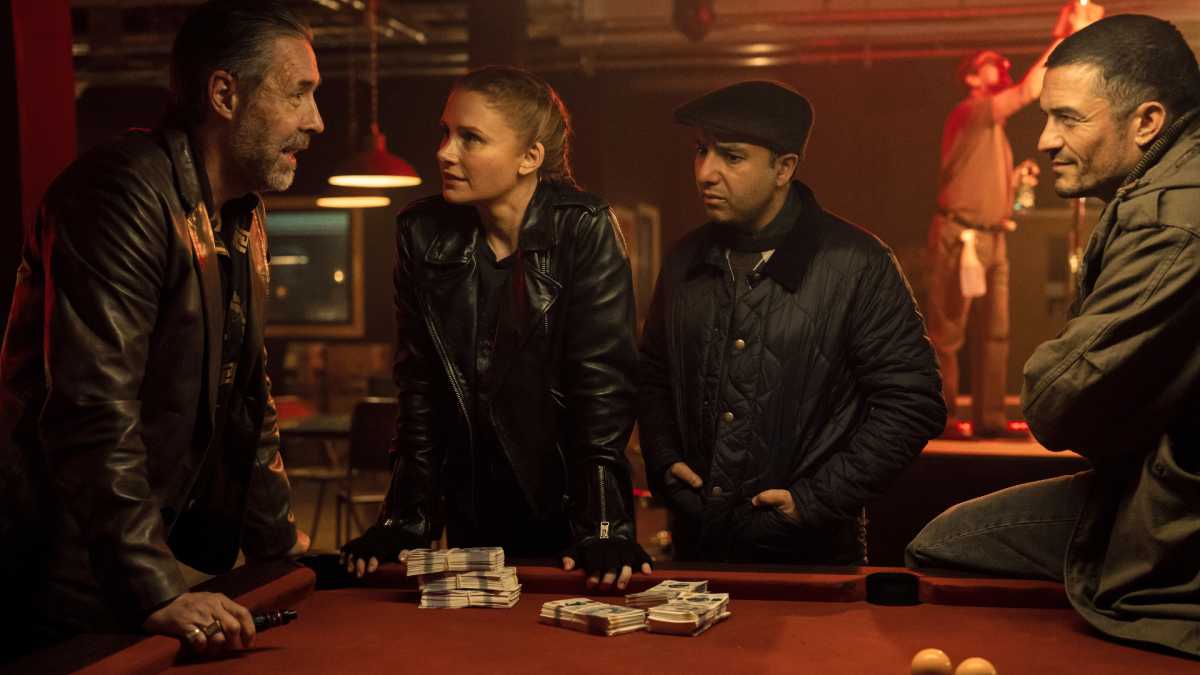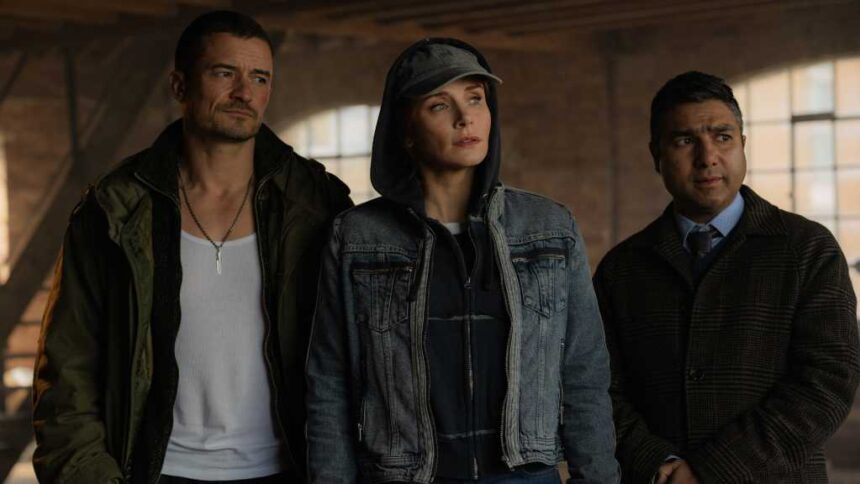Improv is a comedy art form that has long struggled to be celebrated on the big screen. Most people will know it from the television series Whose Line is it Anyway?, which is based on games and limited-time scenes (AKA, short form improv) that perfectly suit bite-sized TV clips that go viral on YouTube.
However, Amazon Prime Video’s latest hit, Deep Cover, aims to change that. As a former improv troupe leader, I’m stoked to see it.
If you’re not aware, Deep Cover follows three budding improv comics (Bryce Dallas Howard, Orlando Bloom & Nick Mohammed) who are hired by a rogue detective (Sean Bean) to infiltrate a drug gang in London.
Peter Mountain/© 2024 COPERTURA PRODUCTIONS LTD.
While their enthusiasm for embracing the unknown is a benefit on the stage, applying it to dangerous, criminal scenarios very quickly escalates. The film premiered at SXSW London last week and hits Amazon Prime Video tomorrow, 12 June 2025.
I first learned about improv from the aforementioned Whose Line and was immediately hooked. As a Theatre student, the thought of being freed from learning lines and having the opportunity to take a scene wherever you and your fellow actors wanted was incredibly liberating.
I was lucky enough to train in more complex types of improv (ie, long form) at comedy schools such as Hoopla and The Free Association. I then took those findings back to my own troupe at university, where I taught weekly classes and directed numerous showcases – including several 24-hour shows called Improvathons (which I’m still exhausted just thinking about).
No matter the type of improv I performed, whichever group I played in, there was a key theme – trusting your fellow actors, and not forcing your own agenda or wishes on a scene. This is a central theme in Deep Cover and is touched on both literally and figuratively.
At the beginning of the film, we meet Dallas Howard’s character, Kat, teaching an improv class in London’s iconic Comedy Store. We see an example of a character blocking a scene, ie refusing to follow the ‘yes, and’ rule by not accepting another performer’s claim and trying to force a new job on them.
Kat explains how this stops a scene from flourishing, as her future detective partners, Marlon and Hugh, listen in. Taking risks and rolling with the punches is all part of improv, and this was something Bryce highlighted as a theme on the set of the film in a Q&A after the film: “…what I take away is the value of teamwork, and how really improvisation, what you’re meant to do is be present and listen, and that’s your starting point”.
“…just to be someone that is truly able to have that beginner’s mind and play with another person, without an agenda… you know you’re not going to win the scene, you’re just trying to play.”
But how does that apply to the detective work in the film? What starts as a simple instance of fishing for information with our three heroes at a newsagent very quickly spirals out of control.
While Kat’s experience allows her to keep her cool, struggling actor Marlon can’t help but butt in and add in unnecessary details about his character’s gritting upbringing on the mean streets of Manchester (props on the accent, Bloom, from a Warringtonian), while Hugh’s desperation to embrace the ‘yes, and’ rule somehow leads the group stumbling across something far more important than a dealer.
They’re then led to the den of ‘Fly’ (Paddy Constantine), a notorious figure in the scene who is responsible for huge quantities of product and money within the drug trade.

Peter Mountain/© 2024 COPERTURA PRODUCTIONS LTD.
The three manage somehow to bluff their way into appearing to be important figures themselves, bartering for product, staying level-headed when weapons come out, and going above and beyond to show their knowledge of the drugs themselves – Mohammad’s dedication in one scene had the cinema in stitches.
It’s this trust between the three that leads them deep into the drug scene of the UK capital and puts them face-to-face with some of the most dangerous criminals in the country. While the plot does ask for suspension of disbelief quite a lot, that’s often what improv needs for audiences to be onside – when scenes completely evolve into jokes of their own, taking on a new life that’s far from where they started.
The Q&A did confirm that while director Tom Kingsley has plenty of experience with improv on sets with shows such as Stath Lets Flats, there actually wasn’t a lot of room for going off book: “It’s a really tightly worked out script, like it goes a mile a minute – it’s really intricately constructed.”
While that does feel like a missed opportunity in a film all about improv, the love letter to the art is never lost. As mentioned at the start of this piece, it’s very hard to cover improv on the screen outside of short games. But finally, here’s a film with Hollywood A-Listers paying tribute to an incredible art form.
As an improviser, it’s something I never thought I’d see… and I’m so glad it exists.
Deep Cover drops on Amazon Prime Video tomorrow. You can sign up for a 30-day free trial here.
Related articles
Read the full article here












